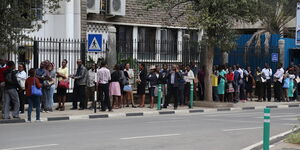Charlene Ruto, President William Ruto’s daughter, has spoken out after the protests witnessed on June 17 and June 25, where Kenyans, mostly youth, went to the streets agitating for greater accountability by the government and better governance.
Through a statement released on Tuesday, July 1, Charlene voiced her dissatisfaction with the strategies used by youth to air out their grievances, including protests and hate raids. Citing her interactions with youth over the past three years, she noted that the standout theme was ‘connection, not conflict.’
She described acts such as protests and hate raids, where Kenyans 'pass their greetings' to political leaders, as acts that do not benefit the nation.
“There is no nation that will ever benefit from encouraging division, be it generational, tribal, or even racial,” she stated.
“Peer pressure, mob mentality, hate raids ('Kusalimia watu'), and riots do not qualify as unity,” Charlene asserted.
Instead, Charlene urged Kenyans to shun the crude methods and devise ways to direct their energies towards more constructive reforms and engagement.
“How do we convert our passion to policy, our ideas to tangible plans, our energy for riots to reform-based engagements, shouting to constructive dialogue, and intense emotions into patriotism?” she quipped
Protests on Tuesday, June 17, were held in commemoration of slain teacher and blogger Albert Ojwang, who died in police custody. The protests were mostly prevalent in Nairobi’s Central Business District (CBD) and were marred by cases of police brutality and the infiltration of goons who looted shops and robbed civilians.
The June 25 protests, which took place in several areas across the country, including the Nairobi CBD, saw a greater number of injuries and several casualties.
According to several sources, amongst them the Kenya National Commission on Human Rights (KNCHR), over 400 people were injured during the protests. This included protesters, journalists and police officers. Of these, 83 were referred for specialised treatment, with eight said to have gunshot wounds.
On the other hand, the hate raids originally began at the height of last year’s anti-Finance Bill protests, where Kenyans took it upon themselves to hold leaders, amongst them Members of Parliament and even Ruto, accountable for their actions.
Citizens resorted to sharing the numbers of politicians online, seemingly a breach of Data Protection laws, and spamming the leaders with phone calls and messages to prevent them from passing the contentious 2024 Finance Bill.
This became so rampant to the extent that some Kenyans created a directory of the politicians’ phone numbers and proceeded to share it on social media for all and sundry to see.
When the National Assembly ended up passing the law, MPs who voted yes were particularly singled out, with Kenyans proceeding to ‘pass their greetings.’
Picking up from the anti-Finance Bill demos, Kenyans applied the concept of ‘kusalimia watu’ on future occasions where leaders transgressed. Leaders who were on the receiving end of the ‘greetings’ often saw the funny side, acknowledging the salutations by Kenyans.
However, some lamented over the ‘greetings,’ complaining of harassment contrary to the law and calling upon the authorities to take action.












